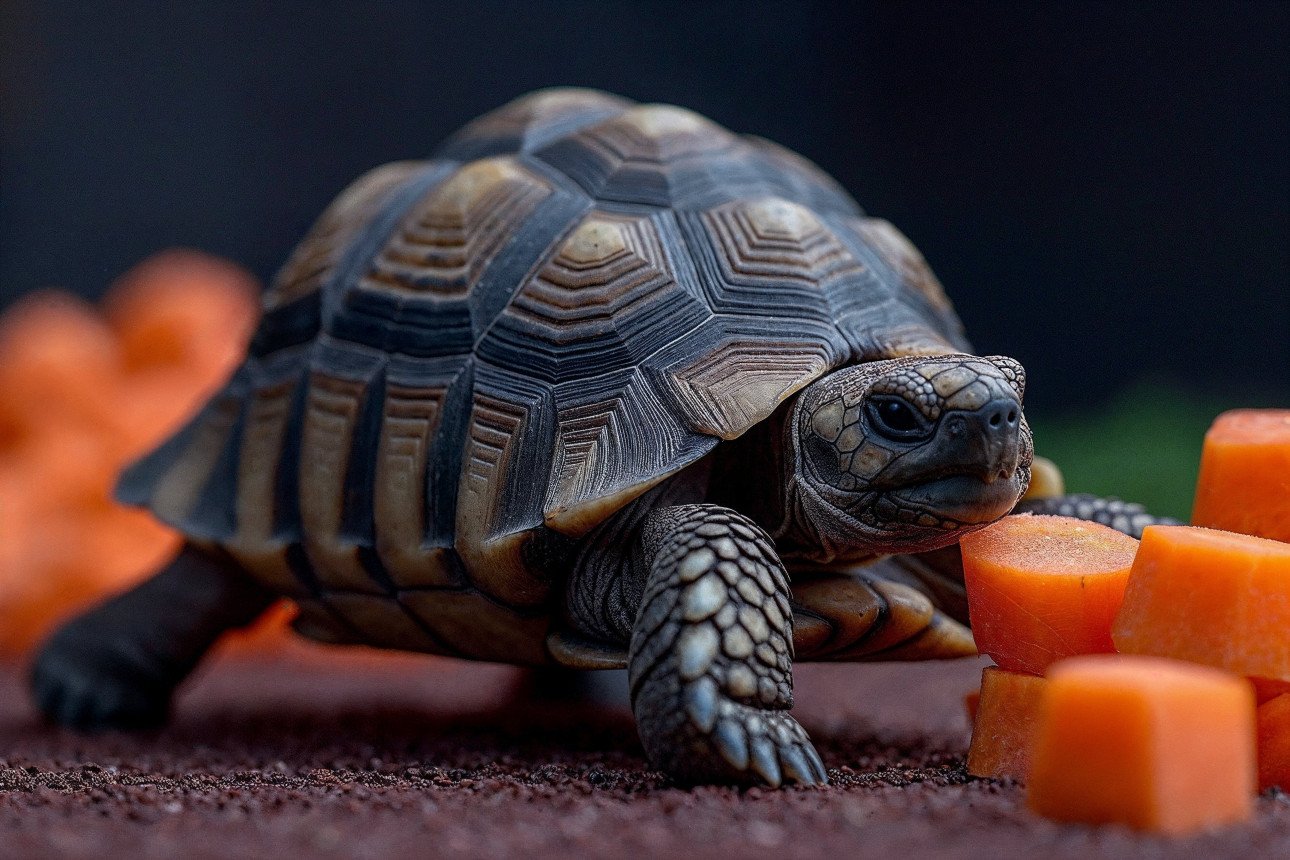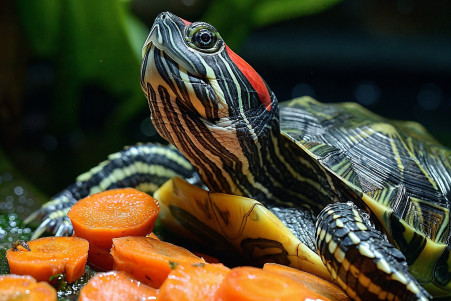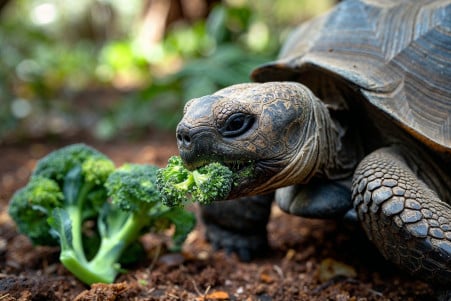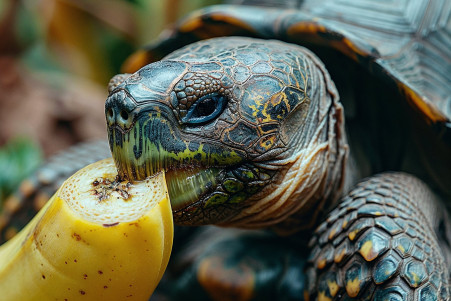Can Tortoises Eat Carrots? Nutritional Guidelines and Species-Specific Diets
31 January 2024 • Updated 6 February 2024

Tortoises are known for their wide-ranging diets, but does that mean that carrots can be part of their healthy eating plan? It turns out that tortoises can eat carrots, but they should be considered a special treat.
That said, carrots do offer some nutritional benefits, including vitamin A and potassium. Still, because of their sugar and oxalate levels, carrots, especially the leafy green tops, should be fed in moderation to ensure that the tortoise’s diet is as well-balanced and tailored to their species’ needs as possible.
This article will take a deep dive into a number of scientific papers and expert recommendations to help shed light on what tortoises need in their diets. We’ll look at the nutritional content of carrots, how they may or may not impact the health of reptiles, and how these things line up with the dietary needs of different tortoise species.
By covering these different areas of research, we hope to give you the information you need to decide whether or not to feed your tortoise carrots.
Can tortoises eat carrots?
Carrots in a Shell: Nutritional Value for Tortoises
If fed in moderation, carrots can be a nutritious addition to a tortoise’s diet. According to Healthline, carrots are a good source of beta carotene, which the body converts to vitamin A. Vitamin A is important for a tortoise’s overall health, including vision and immune function. Carrots are also high in fiber, which is good for digestion, and potassium, which helps the body maintain the right balance of fluids and supports muscle function.
That said, experts warn that tortoise owners should be careful because carrots are high in oxalic acid and natural sugars. According to WebMD, consuming too much beta carotene can lead to carotenemia, a condition that causes the skin to turn yellow or orange. While the natural sugars in carrots can be good for tortoises, they can also cause metabolic imbalances if they are consumed in excess.
If these factors are taken into account, carrots can be a nutritious part of a tortoise’s diet when they are fed in moderation.
As Medical News Today explains, the fiber in carrots can help support a tortoise’s digestive health, which is important for reptiles.
To make sure that a tortoise’s diet is healthy and that they get the most nutritional value from the foods they eat, it’s best to feed them a variety of foods and to make sure that the frequency and portion sizes of the foods they eat are tailored to their specific needs. This will help ensure that tortoises get the benefits of carrots without the potential health risks.
Why Fiber Is Important in Tortoise Diets
One of the most important factors in tortoise digestion and gut health is dietary fiber. Fiber helps keep bowel movements regular and is important for overall gut health.
A study of the Galapagos tortoise, which was published on PubMed by Martin Wikelski, even notes the importance of digestive retention time in herbivorous animals like tortoises, reporting median retention times of between six and 28 days. This means that fibrous foods like carrots are fermented in the tortoise’s gut, which is good for the tortoise’s nutrition because it allows for more nutrient absorption.
An article in PMC goes into even more detail about the importance of fiber, noting that it has a positive impact on the gut microbiota and, as a result, the metabolism, immunity, and intestinal function of animals. The interaction between fiber and the gut microbiota leads to the production of short-chain fatty acids, which are important for gut health and inflammation control.
This makes it clear that the amount of fiber in a tortoise’s diet needs to be taken into account, especially when you consider the tortoise’s natural environment and the tortoise’s individual health. The right amount of fiber can help the tortoise’s digestive system work as it should, making sure that the tortoise gets the most out of its food, even when it’s a special treat like carrots.
How to Feed Carrots to Different Tortoise Species
Tortoises are not one-size-fits-all animals, and their dietary needs vary greatly depending on the species and the specific nutrients found in their natural habitats.
For example, Mediterranean Spur Thighed (Testudo graeca) and Hermann’s tortoises (Testudo hermanni) are best fed a diet that is high in fiber and low in protein, and that doesn’t include fruits or root vegetables like carrots.
According to the Tortoise Trust, these tortoises are naturally adapted to eat a wide variety of plant material, which helps them get all the minerals they need.
On the other hand, research published in PMC by Blair O. Wolf shows that desert tortoises (Gopherus agassizii) may have a more varied diet in the wild due to their desert environment, but they still need a diet that is low in sugar and high in fiber, which are important things to keep in mind when feeding them carrots.
While carrots can provide vitamins and trace minerals, they can also pose risks if they are not fed in moderation, especially because of their sugar content and oxalates.
For Mediterranean tortoises, this means that a small piece of carrot can be offered occasionally, while for desert tortoises like the Russian tortoise (Testudo horsfieldii), it can be offered a little more often due to the variety of foods they eat in the wild, according to ExoticDirect.
In general, when introducing carrots to a tortoise’s diet, it’s important to watch how the tortoise reacts to the new food and adjust the frequency of feeding accordingly to make sure that the treat is a small part of a balanced, species-appropriate diet that supports the tortoise’s overall health.
Carrot Care: How to Feed Your Tortoise Carrots
If you want to feed your tortoise carrots, the key is in the preparation. First, make sure to wash the carrots thoroughly to remove any pesticides. Then, chop the carrots into small, bite-sized pieces that your tortoise can easily eat.
You can also peel the carrots if the skin is too tough, but this is optional. It’s also important to introduce carrots into your tortoise’s diet slowly so that you can monitor their reaction. Look for any changes in their digestion or signs of distress, as these could be signs that carrots aren’t a good fit for your tortoise.
The Tortoise Table recommends feeding carrots in moderation, especially to tortoise species that wouldn’t eat high-carb foods in the wild. For example, a small piece of carrot once a week may be enough for a young tortoise, while an adult tortoise may only need a piece once every few weeks, depending on their species and overall health.
If you’re looking for other options to feed your tortoise instead of carrots, you may want to consider other vegetables that are low in sugars and oxalates, such as dark leafy greens.
For example, Hepper says that kale is a great option that can be fed to tortoises to add some variety to their diet. By paying close attention to your tortoise and finding other options that work for them, you can make sure that you’re feeding them a diet that’s both healthy and enjoyable.
Takeaways on Tortoises and Carrots
Tortoises can benefit from eating carrots as a way to get important vitamins and minerals that can help them stay healthy. However, it’s important to make sure that you don’t overdo it, as the natural sugars and oxalates in carrots can lead to problems like carotenemia or metabolic imbalances.
This article has also highlighted the importance of understanding the specific dietary needs of different tortoise species, which can impact whether or not carrots are a good and safe option for feeding these reptiles.
Tortoise owners should stay up to date on the latest research and consult with reputable veterinarians to make sure they are meeting their pets’ nutritional needs. While an occasional carrot can help ensure that a tortoise gets a variety of nutrients, it’s important to make sure that it doesn’t take the place of the key components of a tortoise’s diet based on their specific species.
In summary, while carrots can be part of a tortoise’s diet, it’s important to make sure that they are fed to tortoises in a way that ensures that their needs are met and that they stay healthy.


